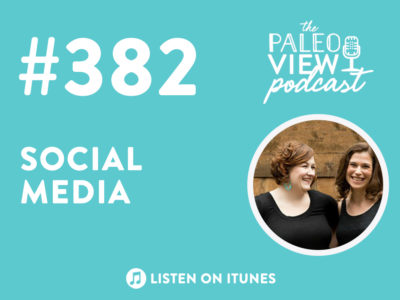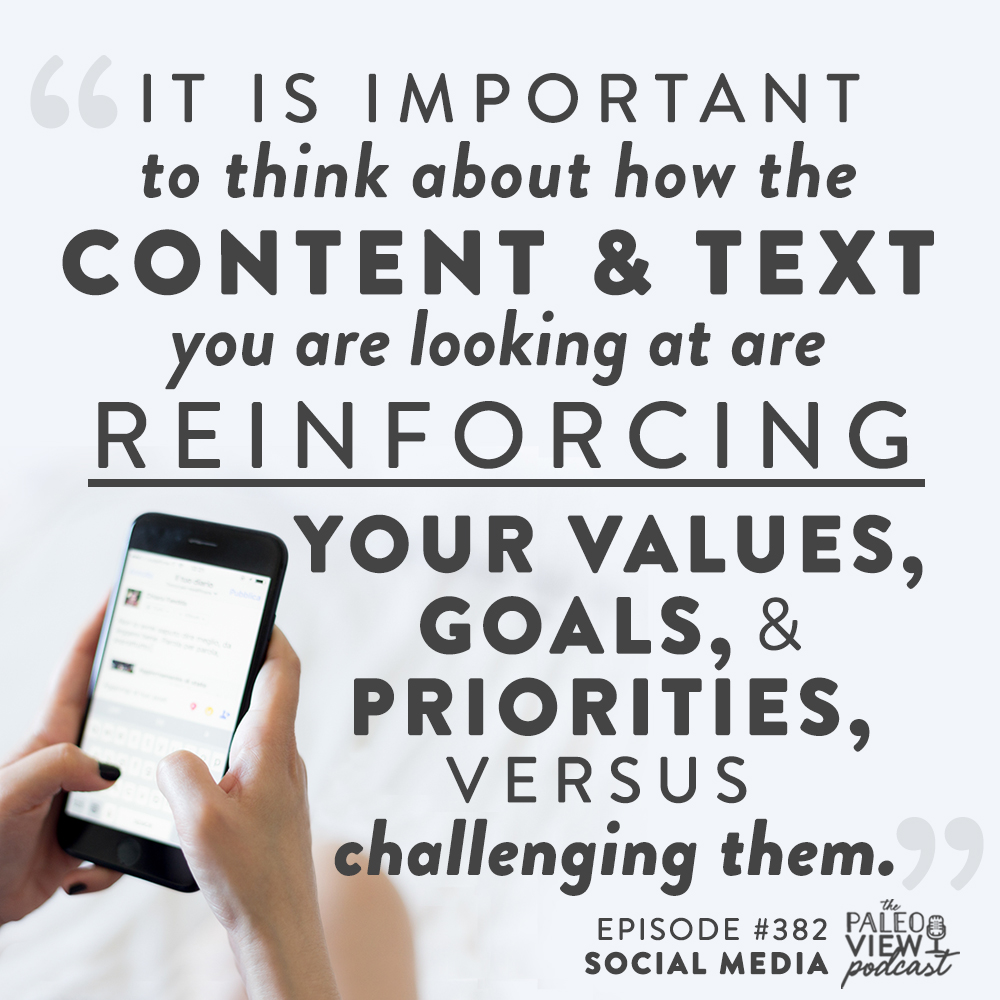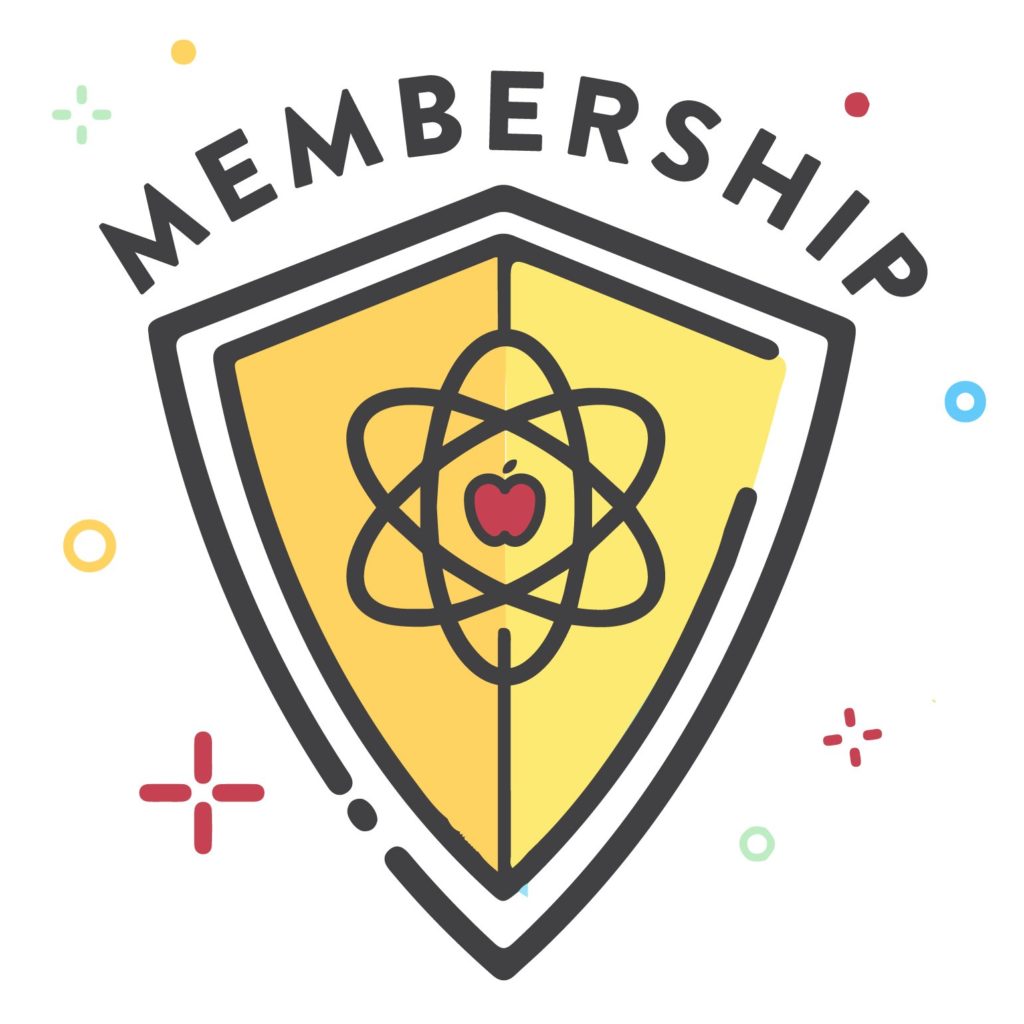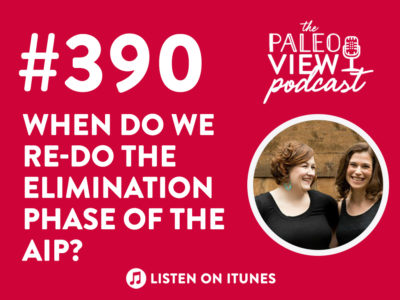On this week’s show, Stacy and Sarah discuss the way social media impacts our health. Sarah shares the research on this subject, Stacy reflects on her experience with Comparison Syndrome, and both give amazing ideas on how to curate a feed that adds value to your life. Enjoy!
If you enjoy the show, please review it on iTunes!
The Paleo View (TPV), Episode 382: Social Media
Welcome back to episode 382 of The Paleo View! (0:40)
This week, Stacy is talking about a topic that is top of mind for a lot of people.
However, we often talk about this but don’t actually do anything about it.
Stacy’s hope is that through the science, discussion and recommendations, change for both the end of 2019 and the new year ahead will be inspired.
With the new decade, it is a chance to refresh and revamp.
Sarah and Stacy laughed about their year changing memories, especially the Y2K days.
Social Media Evolution
In the early 2000s, social media was a great way to connect with people you lost touch with.
There are so many different social media platforms these days, and new ones are always being launched.
For the purpose of this week’s show, Facebook and Instagram will be referenced, but the tips apply across all platforms.
Save 70% Off the AIP Lecture Series!
Learn everything you need to know about the Autoimmune Protocol to regain your health!
I am loving this AIP course and all the information I am receiving. The amount of work you have put into this is amazing and greatly, GREATLY, appreciated. Thank you so much. Taking this course gives me the knowledge I need to understand why my body is doing what it is doing and reinforces my determination to continue along this dietary path to heal it. Invaluable!
Carmen Maier
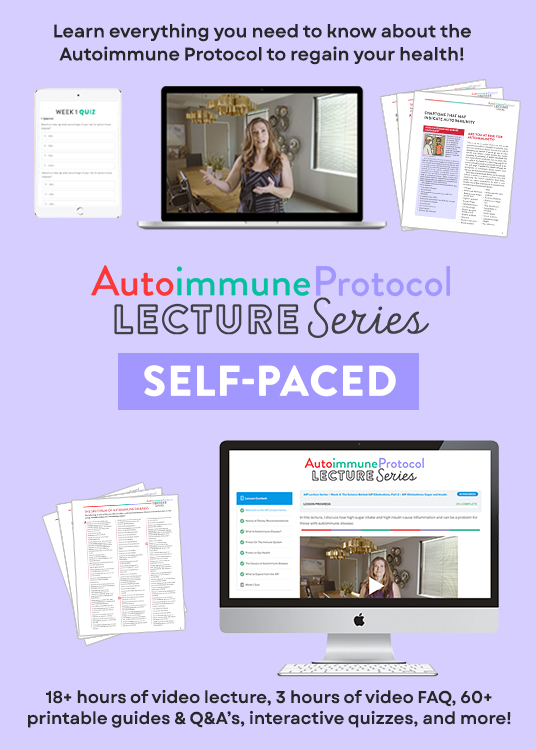
Social media is a constant evolution, but the principles remain the same.
You are interacting with people in the way they want you to interact with them; it is not reality.
Accounts are carefully curated, especially in the case of influencers.
Because influencers’ livelihood is intrinsically linked to their social media image, it is a very carefully planned image.
Stacy uses social media for her livelihood and shared a bit about her approach and principles.
Oftentimes people experience Comparison Syndrome (10:29).
This is not just from the perspective of large influencers but is more strongly generated from.
We as audience members are in control of how we perceive and react to what is happening.
It is not our job to be telling someone what they should or should not be doing.
If we don’t like what someone is doing, we have the ability to walk away, to unfollow, to mute, and to not participate.
More on Comparison Syndrome
Comparison Syndrome happens when you look at someone and think I wish I had that, their life is better than mine, or I wish I looked like another person.
When you have these feelings, Stacy encourages you to stop, think about what just happened to cause those feelings and make a change to redirect them.
Stacy shared on her experience with following people within the fitness space for inspiration.
It took her a year and a half to reformulate her feed.
She had to own her reaction each and every time and take action in that moment.
These feelings are rampant with younger people especially.
A desire to be seen in a certain way is a very real challenge for people in younger generations.
Around the holidays, in particular, we see such a heavy flood of carefully curated images.
This week’s episode is meant to inspire us to be thoughtful and grateful for what we have and the life we get to live.
The Research
Where the research is at with social media is on how it impacts our social connectivity. (17:54)
In many ways, social media has replaced more intimate one-on-one connections with people.
This is where social media begins to have a negative impact on our health.
We can use social media where it actually improves our connectivity.
However, there are other ways that we can use social media that magnifies social isolation, depression, and envy.
The research shows that interacting with people through social media does not deliver the same rewards as interacting with someone in person.
It doesn’t deliver the same level of emotional support or social support.
These are important elements of mental health and life satisfaction.
If our interactions with people are only online, we are not getting the same benefits as we would if we interacted with them in person.
People who are already vulnerable or have previous battles with depression and anxiety are more likely to have a magnification of negative emotions in response to social media.
Sarah brought up the research around Social Comparison Syndrome.
Negative interactions online do not solely refer to cyberbullying.
Getting into an argument, seeing negative comments, and someone sharing their bad mood can all lower self-esteem, cause us to ruminate, and magnify our perception of shortcomings in ourselves.
The Social Comparison Orientation Score is a personality trait that shows to what extent this impacts us.
When you post and someone interacts with it right away it has this short-term impact of making you feel more connected.
However, there is still this overall negative effect.
When you think about the short-term reward, but a long-term loss, this is when it starts to sound like an addiction.
The research is more around screen addiction and less about social media addiction.
This is a new field of research that is opening up.
There are ways that you can protect yourself from these negative effects of social media.
People who use social media to keep in touch with people in between seeing them show signs of gaining positive results from this form of use.
If you are someone who is not susceptible to depression, anxiety or social comparison, you are much less likely to have any harmful efforts.
There are some guidelines that can come out of the scientific literature on the impact of social media use and mental health. (26:09)
They boil down to tell us that using social media to enhance our relationships and our social connection with others is best.
There is still room in here for using social media as entertainment, but it involves a lot of self-awareness.
Stacy reminds listeners that we own our reactions.
We need to think about how to curate a space that is helpful, foster positive relationships, and allows us to be the best version of ourselves.
Curating Your Feed
Filling your feeds with things that feed your goals, versus what undermines them, is key. (32:55)
There are ways to hide things from your feed, across all platforms, without unfollowing or unfriending somebody.
These are empowering options that still allow you to connect with people but on your terms.
Sarah wants to encourage listeners to not just think about the things that you have a negative reaction to, but also the things you have an unhealthy positive reaction to.
What would be in your feed that would enrich your life?
Sarah shared about what kind of things are in her feed.
It is important to think about how the content and text you are looking at are reinforcing your values, goals, and priorities, versus challenging them.
It is important to not isolate ourselves online from opposing points of view.
However, at the same time, the opposing views should be constructive.
Accounts that are information-based allow for personal growth.
It is not just about how we react to social media, but also about how we interact with social media.
Sarah likes to remind herself that she is interacting with a person online.
Stacy shared on how to ease into the uncomfortable when making the choice to remove personal contacts from your feed.
When you find the content you really enjoy, the more feedback you give to it the better you will feel.
It will add that human interaction to the content you are viewing.
Remove the things that you aren’t interacting with so it doesn’t clog up your feed.
Or interact more with the things you enjoy so that the algorithms favor similar content.
Related Research
There was an interesting study that was published a few weeks ago about the changes that happen in our brain when we complain. (46:24)
On average people will complain once a minute in conversation.
We especially do this online, using it as an outlet to complain.
When we complain frequently and don’t check it, we increase the region of the brain that is used for complaining.
It becomes easier to be in a negative mindset.
This research study showed why it is very important to develop a baseline of positivity.
To develop an attitude of gratitude, look for the things you can be grateful for in each situation.
Rather than assigning blame, find common ground.
Rather than just complaining, advocate for some kind of resolution.
If there is not a resultion (ex: it is raining today), this is when an attitude of gratitude can really change your outlook.
We can apply this online when we are seeing things that would normally rope us into a complaining/negative conversation.
We can be intentional about how we are interacting with content.
When you find yourself in a negative spiral (in all areas of life), it is not just a matter of examining how you got there but also asking yourself how can you fix it or change your view.
Closing Thoughts
Stacy thanked listeners for joining Sarah and Stacy for a podcast episode on this subject.
She hopes that this podcast brings positive experiences, education, and inspiration to your life.
Thank you for being here and for engaging with them!
Stacy and Sarah would love to engage more with you listeners on social media.
Thank you so much for all the times when you share this show with others and leave a review!
Thanks again for listening! (54:17)

